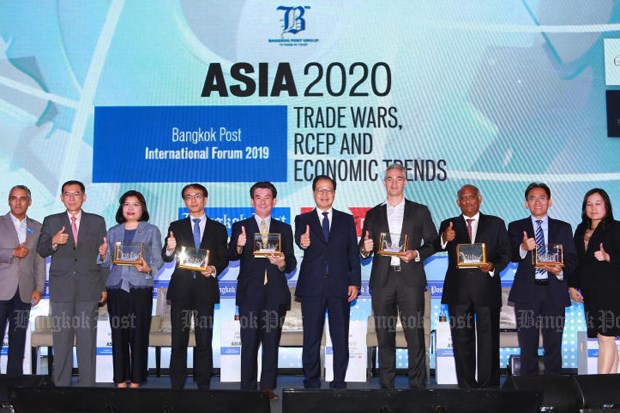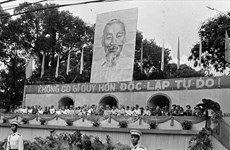Thailand optimistic about RCEP’s benefits after India’s withdrawal
Despite the setbacks, the Regional Comprehensive Economic Partnership (RCEP) deal has the potential to dramatically improve economic prospects among its members, said Auramon Supthaweethum, Director-General of the Trade Negotiations Department under the Thai Ministry of Commerce.
 Speakers take a group photo with Worachai Bhicharnchitr (fourth right), vice-chairman of Bangkok Post Plc, at the forum on November 21 (Source: https://www.bangkokpost.com/)
Speakers take a group photo with Worachai Bhicharnchitr (fourth right), vice-chairman of Bangkok Post Plc, at the forum on November 21 (Source: https://www.bangkokpost.com/)Bangkok (VNA) - Despite the setbacks, the Regional Comprehensive Economic Partnership (RCEP) deal has the potential to dramatically improve economic prospects among its members, said Auramon Supthaweethum, Director-General of the Trade Negotiations Department under the Thai Ministry of Commerce.
Speaking at an international forum on trade wars, RCEP and economic trends hosted by Bangkok Post in Bangkok on November 21, Auramon said the RCEP will be the largest trade deal Thailand has ever joined.
It is a high-quality free trade agreement (FTA) that goes well beyond existing FTAs, and Thailand believes that the RCEP will enhance competitiveness and productivity while facilitating trade and investment among the trade pact’s member countries, she stressed.
Auramon said her department will still have to sell the idea to parliament and business stakeholders before the government signs off on the final version, adding that to get relevant parties cooperating, the deal must be balanced, spreading its benefits among stakeholders and providing remediation to the inevitable losers in the FTA.
The RCEP trade deal, which has been under negotiation for the past six years, saw a major setback when India, one of the RCEP's 16 members, walked out at the last minute of the talks at the 35th ASEAN Summit in Bangkok earlier this month.
It is a multilateral trade agreement between the 10 member states of ASEAN - Malaysia, Brunei, Cambodia, Indonesia, Laos, Myanmar, the Philippines, Singapore, Thailand and Vietnam - and its partners. It aims to set up a stronger cooperation foundation in the region, focusing on trade, service, and investment.
Once signed, the deal will create the largest free trade area in the world with about 3.5 billion people and making up 30 percent of the global GDP and 40 percent of the world trade./.












